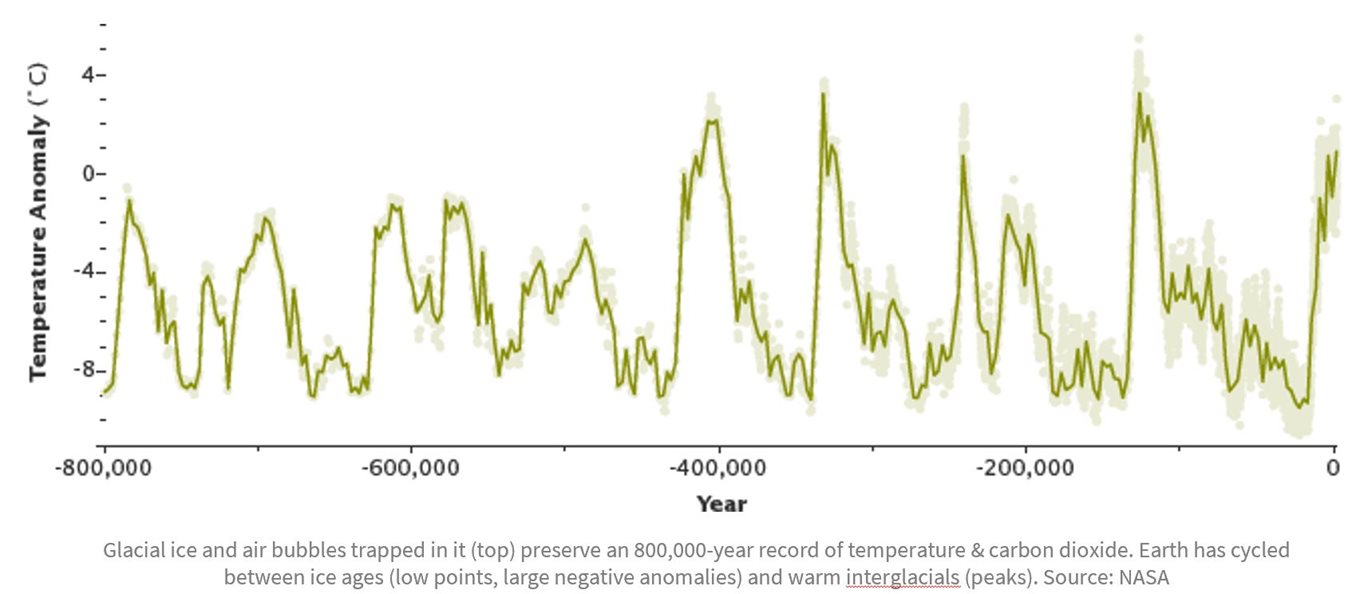Changes in the Earth’s climate is not something new and these changes have had a profound influence on the history of life on the planet.
These natural variations occurred through internal fluctuations that exchange energy, water and carbon between the atmosphere, oceans, land and ice, and from external influences on the climate system, including variations in the energy received from the sun and the effects of volcanic eruptions.
Ice cores and geological records show that the global temperature has changed over the last 800,000 years when compared to the average temperature of the Earth over the last 1,000 years.

There have been warming periods where temperatures were slightly higher than those we experience today. Through these periods, sea levels were far higher. For example, 125,000 years ago, sea levels were 5 - 10 m higher than they are today due to melting of ice sheets. There are also times in Earth's history when there were very cold glacial periods, otherwise known as 'Ice Ages'.
These global climate change has typically occurred very slowly over thousands or millions of years and have been caused by many natural factors, variations in output energy from the sun, changes in the Earth’s orbit, changes in ocean circulation and changes in composition of the atmosphere.

Records from thousands of weather stations around the world show the temperature measured at the Earth’s surface has increased substantially over the past century, and especially over the past 50 years. Other evidence from around the world, including warming oceans from surface to depths and reductions in ice and snow cover, provide further proof that planetary scale warming is taking place.
These observations make it clear that climate change is occurring more rapidly than in the past.

What is different about this period of the earth’s history is the influence of human activities on natural climate change and rigorous scientific research demonstrates that the greenhouse gases emitted by human activities are the primary driver.
“Human activities are estimated to have caused approximately 1.0°C of global warming above pre-industrial levels, with a likely range of 0.8°C to 1.2°C. Global warming is likely to reach 1.5°C between 2030 and 2052 if it continues to increase at the current rate” - IPCC, Special Report - Global Warming of 1.5 ºC
Satellites orbiting the Earth and monitoring stations on the ground show that concentrations of greenhouse gases in the atmosphere are increasing, in particular carbon dioxide, which is enhancing the earth's natural greenhouse effect.

This is leading to rising temperatures and disruption to the climate.
A 1ºC global warming may not seem significant but it takes a vast amount of heat to warm all the oceans, atmosphere and land and these gradual increases in temperature have a wide range of impacts on our daily lives and the frequency and intensity of extreme temperatures. We are already seeing dramatic impacts – altered weather patterns, reduced snow and ice and a rise in sea levels.
The world warmed by about 4ºC – 5ºC over the millennia since the last Ice Age, as part of the natural cycle tied to changes in the Earth’s orbit about the Sun, which drastically changed the conditions on Earth.
If the present accumulation of carbon dioxide in the atmosphere continues unchecked, greenhouse warming of similar magnitude could occur by as soon as the end of this century. This scale and speed of change would pose major challenges to humans and natural systems.
In October 2018, the Intergovernmental Panel on Climate Change (IPCC) issued a special report -
Global Warming of 1.5ºC - that advised keeping the rise in global temperatures below 1.5ºC this century would require ‘
rapid and far-reaching transitions in energy, land, urban and infrastructure (including transport and buildings), and industrial systems’.
The report stresses the vast difference between the devastation from 1.5°C, what’s considered the moderate level of average warming, and 2°C.
“We are the last generation that can prevent irreparable damage to our planet.”
- UN Summit, General Assembly President María Fernanda Espinosa Garcés, UN Summit 2019.
The IPCC Special Report makes clear that climate change is already happening and warned that every fraction of additional warming would worsen the impacts, from rising sea levels to more devastating droughts to more damaging storms.